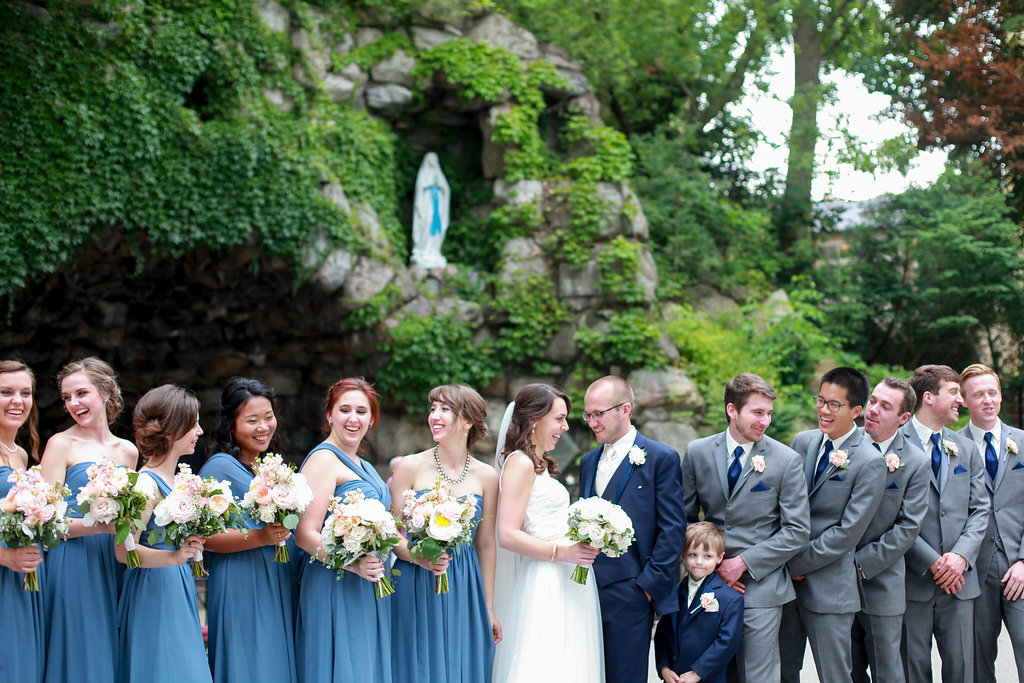Saints for Those Discerning Their Vocation
/Need help discerning your vocation? There’s a saint for that.
PHOTOGRAPHY: NIKAYLA & CO. AS SEEN IN HANNAH AND JOSH’S PRAYER-FILLED FALL WEDDING
One of the most incredible gifts given to us by the Church is the Communion of Saints. Those of us still on earth recognize the holy men and women beholding the face of God in heaven as our brothers and sisters, willing and able to help us on our journey.
In moments where you feel lost or unsure, the saints can help guide your steps and bring you closer to Christ.
For those readers still praying for clarity and courage in pursuing their vocation, here are seven saints to help you in this season of discernment.
St. Joseph
As the earthly father of Jesus, Saint Joseph is a powerful intercessor for his spiritual children. He also demonstrated great trust in the will of God during his life, moving forward in faith even when God’s plan wasn’t entirely clear.
Even when Joseph’s plans for his future seemed abruptly upended when the woman to whom he was betrothed was found with child, he remained open to hearing what God had in store for him. When an angel appeared to Joseph and told him to take Mary as his wife, he was obedient.
If you are struggling with trust in or obedience to God, pray to St. Joseph for help.
St. Therese of Lisieux
Saint Therese of Lisieux, also known as the Little Flower, was a French Carmelite whose writings on the “Little Way” of holiness led her to be named a Doctor of the Church. She is quoted as saying a phrase that all Christians should hold in their mind, especially during seasons of discernment: “My vocation is Love!”
While Saint Therese had confidence in her call to the convent from a very young age, many people ask Saint Therese for help with discerning their vocations and have found their prayers are answered with a rose.
Blessed Pier Giorgio Frassati
Blessed Pier Giorgio Frassati is often called “the Man of the Beatitudes” because in his 24 years on earth, he lived a life of love and service.
Many people related to Blessed Pier Giorgio because he was an ordinary guy. He became a saint by living his ordinary Christian life well. Like so many of us, he did not have it all figured out. He did not wait for the “big decisions” to be made to begin living a life of heroic virtue and love of the poor.
Ask Blessed Pier Giorgio Frassati to help you pursue holiness and excellence in this season of life.
Related: Readers Share | The Saints Who've Shaped Your Relationships
Sts. Louis and Zelie Martin
Parents of Saint Therese, Saints Louis and Zelie Martin modeled holiness in their call to marriage and family life. However, did you know that they both initially wanted to join the religious life?
I imagine Louis and Zelie felt a lot of sorrow and confusion upon being rejected from the orders they applied to. They might have also questioned their discernment ability; yet, when Zélie first saw Louis, she heard our Blessed Mother tell her that this was the man she was to marry. They went on to have nine children, and the five that would survive infancy went on to become nuns (and saints!).
If you’re feeling confused or unsure in your discernment, ask Saints Louis and Zelie to help you find consolation and courage in this season.
St. Raphael
The archangel Raphael is considered the patron saint of happy meetings (and the unofficial patron saint of those seeking a spouse). In the Book of Tobit, Raphael guides Tobit’s son Tobiah to his future wife Sarah so many people often pray to Saint Raphael to similarly lead them to their future spouse.
Pray to St. Raphael for help finding a holy spouse if you’re called to the vocation of marriage.
St. Ignatius of Loyola
Saint Ignatius of Loyola was the founder of the Jesuits and offers a framework for discerning God’s will through his Spiritual Exercises.
The Spiritual Exercises of St. Ignatius provides rules for the discernment of spirits which can help you better understand the interior movements of your soul and what God desires for your life.
If you are looking for practical ways to pray about your vocation, consider attending an Ignatian retreat and asking St. Ignatius for guidance.
Mary, Spouse of the Holy Spirit
Vocational discernment requires an openness to the Holy Spirit, so who better to turn to than Our Lady, the Spouse of the Holy Spirit, when you are in need of help when it comes to discernment?
Saint Louis de Monfort wrote in True Devotion: “When the Holy Spirit, her spouse, finds Mary in a soul, He hastens there and enters fully into it.”
Turn to Mary and ask her to teach you how to open your heart up to the movement of the Spirit and how to give your “fiat” to whatever He calls you to do.






























